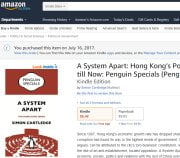I recently mentioned the Penguin Specials on Hong Kong, which are all listed on Amazon’s page on A System Apart. A review of that book pulls some good quotes about how 20 years after the handover, Hong Hong’s economy…
“…is still dominated by a handful of companies, most of them run by ageing tycoons. No new business has risen up to challenge or replace them. No major new industry has been established.”
The reason is the post-1997 governance system that entrenches vested interests into the political structure…
“…opening the way for cronyism and corruption and preventing the kind of changes needed that would allow the city to maintain its economic dynamism.”
 A historical summary: China’s 1980s leaders – with a crude Marxist understanding of a capitalist society – co-opted Hong Kong’s leading business players in the naïve belief that these property/textiles/banking families created the city’s wealth. To reward or keep these ‘various sectors’ onside, Beijing gave them undue influence over the city’s post-1997 government. The result is that our economy is in some ways frozen in the 1980s.
A historical summary: China’s 1980s leaders – with a crude Marxist understanding of a capitalist society – co-opted Hong Kong’s leading business players in the naïve belief that these property/textiles/banking families created the city’s wealth. To reward or keep these ‘various sectors’ onside, Beijing gave them undue influence over the city’s post-1997 government. The result is that our economy is in some ways frozen in the 1980s.
We don’t seem to hear so much about them today, but in the 2000s Hong Kong officials decreed a list of ‘Four Pillar Industries’. (Can you name them all, children?)
The imagery suggests that that they prop up our economy. But it might be more accurate to say they are propped up by our productive economy and long-suffering population.
One is logistics, notably the container port – a facility that London got rid of decades ago because it had better things to do with the space. One is the parasite known as tourism, the hugely subsidized space-hungry displacer of local businesses and source of dead-end jobs. One is financial services, which at least sounds appropriate for a 21st century developed economy, even if it’s probably a bit heavy on the money-laundering side. And the fourth (he checks on Google…) is something called producer and professional services, presumably the marketing/legal/accounting ‘shop front’ for the Mainland manufacturing base that is itself now in decline.
Missing from this is construction, notably of white-elephant infrastructure projects, which (as in the Mainland) boosts short-term GDP and benefits tycoon-linked interests. Also property, which is not an industry (just the buying/selling/renting of concrete boxes) – but it is a giant vacuum-cleaner that helps suck up the proceeds of enterprise along with the Four Leech Industries.
Also missing: the tech, innovation, creative, start-up stuff – but that’s the purpose of this system.
The point of this Friday-meander is that many Hong Kong people are so accustomed to the arrangement described in A System Apart that they don’t question it. They don’t see anything odd about the way the political and economic structures are mirrors. They don’t think it’s a strange coincidence that our entire ruling class comprises personalities who wouldn’t last five minutes in either a political or economic system that was open to competition. And of course, they don’t link the city’s stagnation with the Communist Party’s desperation to exert and maintain control.
I declare the weekend open with a bit of nostalgia for the laid-back old days – toad-worship.


I’m surprised you didn’t link this to the ridiculous list a couple of days ago that places Hong Kong among the world’s supposedly most competitive economies. But things could be worse – we are at least world leaders in shoe shining, baby milk smuggling, and “hub” creation.
Creating “hubs” is an art form. HK has it down.
Three cheers for declaring you’re a “hub” for something but not actually ever having it materialise!
And here we go again…
“Indeed, Hong Kong has the potential to become a world-leading data hub, according to a report released by Ernst & Young.”
“Hong Kong is a global financial hub, business and IT center, and the city has sound legal system, advanced infrastructure, free information, etc. This has helped the city lure many multi-national corporations and mainland Chinese firms into setting up their Asia Pacific IT headquarters here.”
“Hong Kong stands a good chance to evolve from an IT hub into a data hub.”
“Hong Kong government is very supportive of efforts to build the city into a data hub, said Vincent Chan, partner of Ernst & Young and Advisory Services Leader for Hong Kong & Macau.”
All quotes from EJI
Think anyone will want to “hub” all their sensitive data in a place that is, for all intents and purposes, a CCP run town?
Chinese Netizen – didn’t Google drop its data centers here for just that reason?
I think HK missed the boat by not doubling down on Islamic Finance.